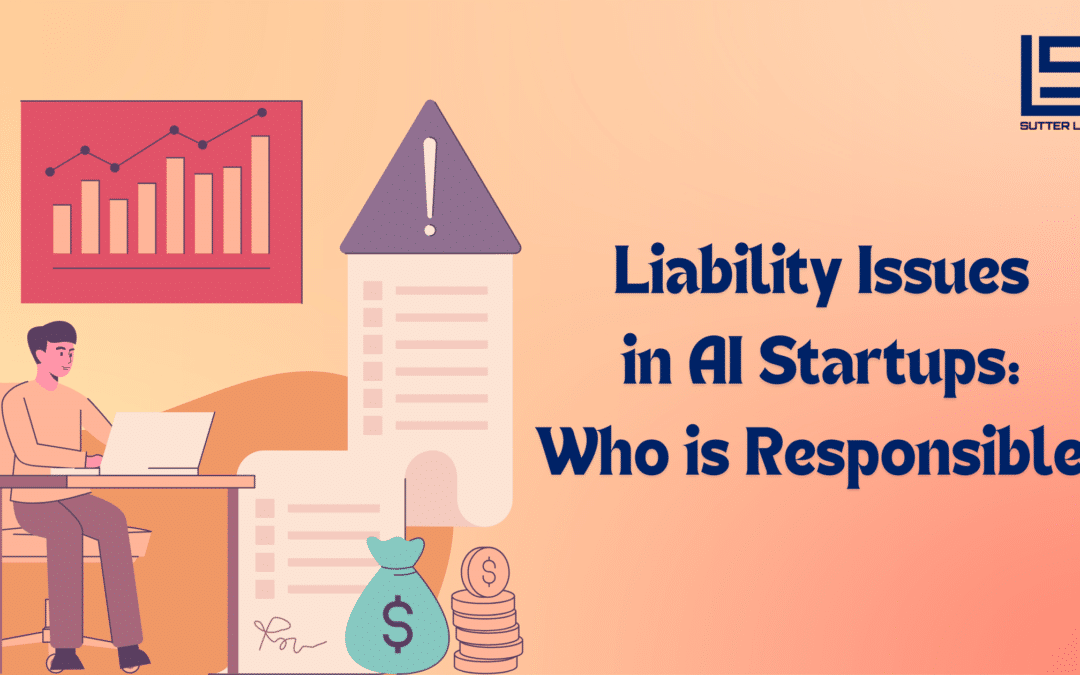Table of Contents
- Introduction to Liability Issues in AI Startups
- Understanding Accountability and Responsibility in AI Startups
- Legal Framework for Liability in AI Startups
- Common Liability Issues Faced by AI Startups
- Mitigating Liability Risks in AI Startups
- Building a Culture of Responsibility in AI Startups
- The Role of Insurance in Mitigating Liability in AI Startups
- Case Studies: Examples of Liability Issues in AI Startups
- The Future of Liability in AI Startups
- Conclusion: Navigating Liability Issues in AI Startups
Introduction to Liability Issues in AI Startups
At Sutter Law, we have been working with startups since 2011. We have always been at the forefront for each new tech trends. As the world becomes increasingly reliant on artificial intelligence (AI) technology, the emergence of AI startups has become more prevalent. With new technology, comes new legal questions, and, as startup attorneys, we are always on the lookout for upcoming pitfalls.
Startups are at the forefront of innovation, developing cutting-edge AI algorithms and applications that have the potential to transform industries.
However, “With great power comes great responsibility” (Spiderman), and AI startups must navigate the complex landscape of liability issues that come with their advancements.
Understanding Accountability and Responsibility in AI Startups
Accountability and responsibility are key concepts in the realm of liability issues in AI startups.
Accountability refers to the obligation of AI startups to answer for the consequences of their actions and the impact of their AI systems.
Responsibility, on the other hand, involves the ethical and moral duty of AI startups to ensure that their AI systems operate in a manner that aligns with societal norms and values.
AI startups must recognize that they bear the responsibility of ensuring that their AI systems are designed and deployed in a way that minimizes harm and maximizes benefits.
This includes addressing issues such as algorithmic bias, privacy concerns, and potential societal implications.
By taking proactive measures to understand and address accountability and responsibility, AI startups can better navigate the liability landscape.
Legal Framework for Liability in AI Startups
The legal framework surrounding liability in AI startups is still evolving, as lawmakers grapple with the rapid pace of technological advancements.
However, there are some key legal considerations that AI startups should be aware of.
One such consideration is product liability, which holds AI startups responsible for any harm caused by their AI systems.
This includes both physical harm and economic losses resulting from AI system failures.
Additionally, AI startups should also consider the potential liability arising from data breaches or misuse of personal information.
Data privacy laws and regulations are becoming increasingly stringent, and startups must ensure that they have robust data protection measures in place to avoid legal repercussions.
Common Liability Issues Faced by AI Startups
AI startups face a range of liability issues, some of which are unique to the field of AI.
One common issue is algorithmic bias, where AI systems produce biased results due to the underlying data or design choices.
This can lead to discriminatory outcomes and legal challenges.
Another liability issue is the potential for AI systems to make errors or fail to perform as intended.
This can result in financial losses for businesses or even pose safety risks in critical applications such as autonomous vehicles or healthcare diagnostics.
Furthermore, AI startups must also consider liability arising from intellectual property infringement.
As AI technology becomes more advanced, the risk of inadvertently infringing on existing patents or copyrights increases.
Mitigating Liability Risks in AI Startups
To mitigate liability risks, AI startups should adopt a proactive approach that encompasses both technical and legal measures.
Firstly, startups should conduct thorough risk assessments to identify potential liability issues and develop strategies to address them.
This may involve implementing robust quality assurance processes, conducting regular audits, and ensuring compliance with relevant regulations.
Additionally, AI startups should invest in ongoing monitoring and testing of their AI systems to identify and rectify any issues promptly.
This includes monitoring for algorithmic bias, regularly updating and improving AI algorithms, and conducting rigorous testing in real-world scenarios.
Furthermore, startups should also consider obtaining appropriate insurance coverage to protect against potential liability claims.
Insurance policies tailored specifically for AI startups can provide financial protection and peace of mind in the event of liability issues.
Building a Culture of Responsibility in AI Startups
Building a culture of responsibility is crucial for AI startups to navigate liability issues effectively.
This involves fostering a strong ethical framework within the organization and ensuring that all employees understand the importance of accountability and responsibility.
AI startups should prioritize transparency and open communication, encouraging employees to speak up about any concerns or potential ethical dilemmas.
By promoting a culture of responsibility, startups can proactively address liability issues and mitigate potential harm.
The Role of Insurance in Mitigating Liability in AI Startups
Insurance plays a vital role in mitigating liability in AI startups.
AI-specific insurance policies can provide coverage for a range of liability issues, including product liability, intellectual property infringement, and data breaches.
These policies can help protect startups from financial losses and legal expenses that may arise from liability claims.
When choosing insurance coverage, AI startups should carefully assess their specific risks and select policies that provide comprehensive protection.
Working with insurance professionals who specialize in AI startups can ensure that startups have the appropriate coverage to navigate potential liability issues.
Case Studies: Examples of Liability Issues in AI Startups
To illustrate the real-world implications of liability issues in AI startups, let’s examine a few case studies:
- In a healthcare AI startup, a diagnostic algorithm misclassified a patient’s condition, resulting in delayed treatment. The patient filed a lawsuit, claiming negligence and seeking compensation for the harm suffered.
- An autonomous vehicle startup faced legal challenges when one of their vehicles caused an accident due to a software glitch. The startup was held liable for the damages caused and had to pay significant compensation to the affected parties.
These case studies highlight the importance of understanding and addressing liability issues in AI startups to avoid costly legal battles and reputational damage.
Read also: Navigating Regulatory Compliance for AI-Based Products
The Future of Liability in AI Startups
As AI technology continues to evolve, liability issues in AI startups will become increasingly complex.
New challenges, such as the ethical implications of AI decision-making and the potential for AI systems to develop unforeseen behaviors, will need to be addressed.
It is crucial for AI startups to stay abreast of legal and regulatory developments and proactively adapt their practices to mitigate emerging liability risks.
Collaboration between AI startups, policymakers, AI attorneys, and legal experts is essential to shape a framework that balances innovation with accountability.
Conclusion: Navigating Liability Issues in AI Startups
Navigating liability issues in AI startups requires a comprehensive understanding of accountability, responsibility, and the legal framework surrounding AI technology.
AI startups must recognize their obligations and take proactive measures to mitigate potential liability risks.
By building a culture of responsibility, adopting technical and legal measures to address liability issues, and obtaining appropriate insurance coverage, AI startups can navigate the complex landscape of liability with confidence.
To ensure you have the necessary legal guidance to navigate liability issues in your AI startup, contact Sutter Law experts.
We focus on providing tailored legal solutions for AI startups, helping you navigate the legal complexities and mitigate potential liability risks.






